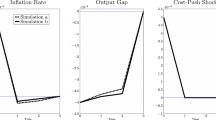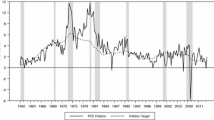Summary.
This paper analyzes how monetary policy in an overlapping generations model can be designed to avoid inflationary consequences of anticipated changes of monetary policies. Avoiding these inflationary consequences will require a once and for all increase (decrease) in monetary growth immediately before the policy switch takes place if the relative risk aversion is greater (less) than unity. If the relative risk aversion is greater than unity, the avoidance of inflationary consequences is also time-consistent. Moreover, a general monetary feedback rule ensures that the economy picks the steady state with the lowest inflation rate. Our results suggest that the difference between unanticipated and anticipated policy switches may not be as important as generally assumed, because the consequences of the latter can be neutralized.
Similar content being viewed by others
Author information
Authors and Affiliations
Additional information
Received: September 19, 1995; revised version: July 27, 1998
Rights and permissions
About this article
Cite this article
Gersbach, H. How to avoid the consequences of anticipated monetary policies. Econ Theory 14, 729–740 (1999). https://doi.org/10.1007/s001990050352
Issue Date:
DOI: https://doi.org/10.1007/s001990050352




